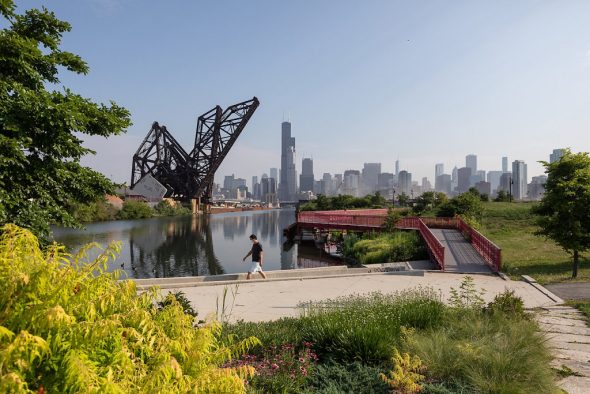UIC teams with Argonne, partners in urban climate change study
A multi-institution partnership, involving Argonne National Laboratory and the University of Illinois Chicago in collaboration with other academic and community partners, has been awarded $25 million over five years from the U.S. Department of Energy to study urban climate change effects at neighborhood, local and regional scales.
The group will establish an urban integrated field laboratory called Community Research on Climate and Urban Science focusing on the Chicago region. The lab will use community input to identify questions and specific areas of urban climate change to study, ensuring that research results directly benefit residents, particularly in disinvested communities. Researchers will also work with organizations and students to collect on-the-ground data and develop climate models relevant at the urban scale.
As the largest contributing collaborator, UIC’s work is backed by about $5 million of the overall award to lead a biogeochemical observation network across the city, collaborate with community groups, and grow educational and workforce development opportunities for educators and students.
Like other U.S. cities, Chicago is already experiencing disruption from climate change in the form of extreme weather, flooding, drought and heat waves. Researchers will measure Chicago’s temperature, precipitation patterns and soil conditions. They will explore how trees, open spaces, buildings, expressways and Lake Michigan are shaping the city’s climate, as well as how the Chicago area influences climate regionally.
And because no two communities are alike, the study aims to create more detailed climate models than ever before to reveal the effects of climate change on individual neighborhoods.
“The goal is to use these tools along with workshops with community partners across the city to reduce systemic economic and racial inequities in exposure to climate stress,” said Max Berkelhammer, UIC associate professor of earth and environmental sciences and co-principal investigator for the project.
This study focuses on climate change at the neighborhood level, so to meet research goals the investigative team includes community-based organizations on Chicago’s South and West sides. This unique collaboration will empower community members to share their needs and concerns, ensuring that researchers deliver information critical to neighborhoods as they transition to clean energy and green infrastructure.
“The community engagement component that UIC is immersed in represents a new approach to climate science research. For instance, we hope that students from local and underresourced high schools will participate in data gathering, assessment and presentation,” said Ralph Cintron, UIC professor of English and Latin American and Latino studies and co-principal investigator.
Community partners involved with the project include Blacks in Green (Woodlawn), Greater Chatham Initiative (Chatham), Puerto Rican Agenda (Humboldt Park) and Metropolitan Mayors Caucus (Chicago area).
The Community Research on Climate and Urban Science is partnering with local and regional colleges and universities to recruit and train the next generation of climate scientists. It will provide educational and workforce development opportunities to students representing several institutions, including Minority-Serving Institutions and historically Black colleges and universities.
“This truly interdisciplinary approach combines the sciences with the humanities to study a very complex urban system and to postulate solutions to mitigate the impacts of climate change. We will capitalize on this unique partnership to train the next generation of professionals in climate and environmental health-related professions,” said Miquel Gonzalez-Meler, UIC professor of biological sciences, and co-principal investigator and director of workforce development at CROCUS.
Other UIC faculty members involved are Akintomide Akinsanola, assistant professor of earth and environmental sciences; Jarrad Hampton-Marcell, assistant professor of biological sciences; Gavin McNicol, assistant professor of earth and environmental sciences; Gabriel Nunez-Mir, assistant professor of biological sciences; Kathryn Nagy, professor and head of earth and environmental sciences; George Crabtree, director of the UIC Energy Initiative and distinguished professor of physics, and electrical and mechanical engineering; and Elena Grossman, program manager for BRACE Illinois in the UIC School of Public Health.
Among the participating colleges and universities joining UIC are Chicago State University, City Colleges of Chicago, North Carolina A&T State University, Northeastern Illinois University, Northwestern University, University of Notre Dame, University of Illinois Urbana-Champaign, University of Wisconsin-Madison, University of Texas-Austin, and Washington University-St. Louis.
While Chicago is the center of this study, the new insights and lessons learned will help researchers create a blueprint to assist other cities worldwide as they work to become resilient to climate change.
“If we understand how climate and urban systems interact at increasingly detailed scales, we can address the challenge in a fair, equitable and sustainable way,” said Cristina Negri, director of Argonne National Laboratory’s Environmental Sciences Division and CROCUS lead. “By advancing the science, we can help neighborhoods, governments and communities envision a climate-ready future. We’re all in this together.”
The Community Research on Climate and Urban Science is funded by the Biological and Environmental Research program in the DOE’s Office of Science.

